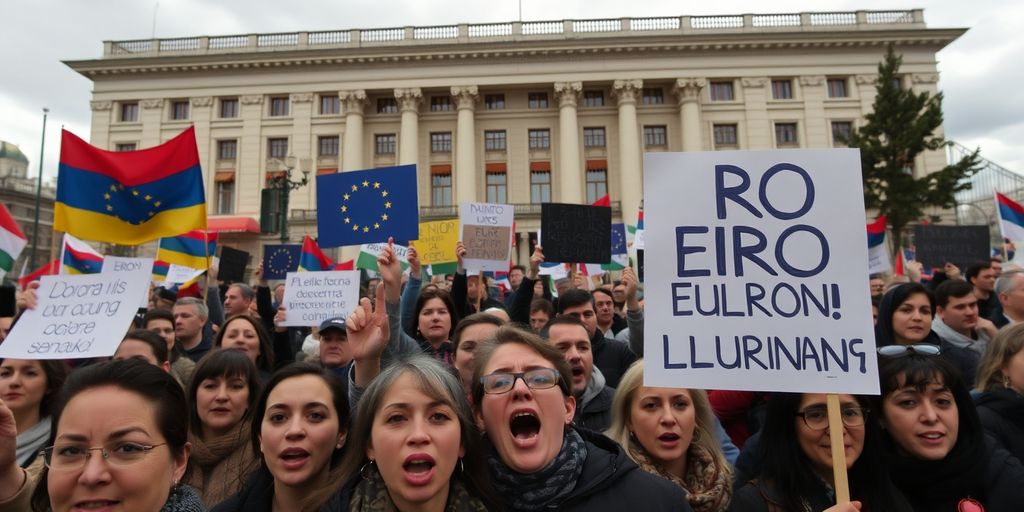Bulgaria is on the brink of adopting the euro by January 2026, but the move has ignited widespread protests and political unrest. Citizens are voicing concerns over potential economic impacts, including inflation and loss of national identity, as the government navigates this significant transition.
Key Takeaways
- Protests erupted nationwide, with citizens demanding a referendum on euro adoption.
- President Rumen Radev proposed a referendum, which was rejected by Parliament.
- The government aims for euro adoption by January 2026, pending European Commission approval.
Protests Across Bulgaria
On May 19, 2025, thousands of Bulgarians took to the streets in major cities, including Sofia, to express their opposition to the euro adoption. Demonstrators blocked key intersections and roads, calling for the preservation of the Bulgarian lev and a national referendum on the euro’s introduction.
Locations of Protests:
- Sofia: Eagles Bridge and National Assembly
- Stara Zagora: Major boulevards
- Ruse: Danube Bridge roundabout
Protesters carried national flags and chanted slogans such as "Resignation" and "No to lobbyist laws," reflecting their dissatisfaction with the current government’s handling of the euro adoption process.
Political Turmoil Surrounding Euro Adoption
The political landscape in Bulgaria has become increasingly contentious following President Radev’s proposal for a referendum on euro adoption. Radev suggested the referendum to gauge public opinion, stating that citizens should have a say in such a significant economic transition. However, this proposal faced swift backlash from the ruling coalition, which accused him of attempting to sabotage the euro adoption process.
Key Political Reactions:
- President Rumen Radev: Advocated for a referendum, citing public concerns over inflation and purchasing power.
- Prime Minister Rosen Zhelyazkov: Criticized Radev’s proposal as a political maneuver, urging parliament to support euro adoption.
- Parliament Speaker Nataliya Kiselova: Declared the referendum proposal unconstitutional, reinforcing the government’s commitment to euro adoption.
Economic Implications of Euro Adoption
Bulgaria’s economy has long been pegged to the euro, and many economists argue that adopting the euro could enhance foreign investment and improve credit ratings. However, public sentiment is divided, with many citizens fearing that euro adoption could lead to price increases similar to those experienced in Croatia after its euro transition.
Concerns Raised by Citizens:
- Potential for inflation and increased living costs.
- Lack of clear government measures to protect purchasing power.
The Path Forward
Despite the protests and political challenges, the Bulgarian government remains committed to adopting the euro by January 2026, pending a positive assessment from the European Commission and the European Central Bank. The upcoming convergence report, expected in June, will play a crucial role in determining Bulgaria’s readiness for eurozone entry.
As the situation unfolds, the government will need to address public concerns and navigate the political landscape carefully to ensure a smooth transition to the euro while maintaining public trust and support. The outcome of this transition will not only affect Bulgaria’s economic landscape but also its social fabric as citizens grapple with the implications of adopting a new currency.
Sources
- Why a train trip from Greece to Bulgaria is a foodie’s dream journey, AFR.
- Bulgarian President Radev Warns of Social Risks and ‘Price Shock’ from Eurozone Transition, Novinite.com.
- Bulgaria’s Insurance Sector Assures Stable Prices Ahead of Euro Adoption – Novinite.com, Novinite.com.
- Bulgaria’s Euro Adoption Sparks Protests and Political Turmoil, BalkanEU.
- Bulgarian Banking Sector Confirms Readiness for Eurozone Entry in 2026 – Novinite.com, Novinite.com.




